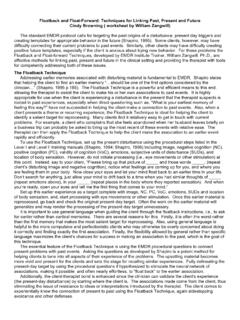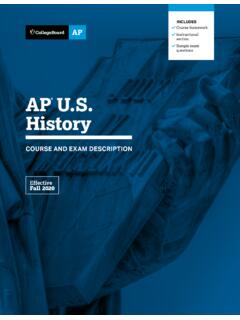Transcription of Regular and Irregular Verbs ...
1 Regular and Irregular Verbs .. 122 Regular Verbs .. 122 Irregular Verbs .. 124 Problem Verbs .. 128 The Twelve Verb Tenses .. 131 Simple Tenses .. 131 Per fect Tenses .. 131 Progressive Tenses .. 131 Per fect Progressive Tenses .. 131 Subject-Verb Agreement .. 135 Consistency in Tense .. 139 Active and Passive Voice .. 140 Strong Verbs .. 143 Subjunctive Mood .. 144 Chapter Review .. 145 Chapter 7 VerbsWriting Activity in MiniatureBefore you work on this chapter, write a Microtheme on the following topic.
2 Write small enough to leave room for marking later. After you have studied this chapter, return to your Microtheme and complete Exercise B to practice what you have Microtheme Topic: Write a Microtheme of 80 to 100 words about people s driving habits that bother you. Give at least one real-life AEXERCISE BMICROTHEMEC onnecting Your Learning Objectives with Your MicrothemeComplete this exercise after you have studied this Check to make sure your Verbs are correct in form and consistent in Check to make sure your subjects and Verbs Check to make sure you have used strong Verbs in the appropriate voice and 12111/26/09 10:57:25 AM11/26/09 10:57:25 AM Copyright 2010 Cengage Learning.
3 All Rights Reserved. May not be copied, scanned, or duplicated, in whole or in part. Due to electronic rights, some third party content may be suppressed from the eBook and/or eChapter(s). Editorial review has deemed that any suppressed content does not materially affect the overall learning experience. Cengage Learning reserves the right to remove additional content at any time if subsequent rights restrictions require 7 VerbsCopyright 2011 Wadsworth, Cengage Learning. All rights reser chapter covers the use of standard Verbs .
4 To some, the word standard implies correct. A more precise meaning is that which is conventional among educated people. Therefore, a standard verb is the right choice in most school assignments, most published writing, and most important public-speaking situations. We all change our language when we move from these formal occa-sions to informal ones: We don t talk to our families in the same way we would speak at a large gathering in public; we don t write letters to friends the same way we write a histor y report.
5 Even with informal language, we would seldom change from standard to nonstandard and Irregular VerbsVerbs can be divided into two categories, called Regular and Irregular . Regular Verbs are predictable, but Irregular Verbs as the term suggests follow no defi -nite pattern. The forms for both Regular and Irregular Verbs var y to show time. present -tense Verbs show an action or a state of being that is occurring at the present time: I like your hat. He is at a hockey game right now. present -tense Verbs can also imply a continuation from the past into the future: She drives to work ever y day.
6 past -tense Verbs show an action or a state of being that occurred in the past : We walked to town yesterday. Tim was president of the club last year. past -participle Verbs are used with helping Verbs such as has, have, and had: Georgina had studied hard before she took the VERBSP resent TenseFor he, she, and it, Regular Verbs in the present tense add an -s or an -es to the base word. The following chart shows the present tense of the base word ask, which is a Regular verb. Singular Plural First Person: I ask we ask Second Person: you ask you ask Third Person: he, she, it asks they askIf the verb ends in -y, you might have to drop the -y and add -ies for he, she, and it.
7 Singular Plural First Person: I tr y we tr y Second Person: you tr y you tr y Third Person: he, she, it tries they tr yPast TenseFor Regular Verbs in the past tense, add -ed to the base Form ( present ) Pastwalk walkedanswer 12211/26/09 10:57:27 AM11/26/09 10:57:27 AM Copyright 2010 Cengage Learning. All Rights Reserved. May not be copied, scanned, or duplicated, in whole or in part.
8 Due to electronic rights, some third party content may be suppressed from the eBook and/or eChapter(s). Editorial review has deemed that any suppressed content does not materially affect the overall learning experience. Cengage Learning reserves the right to remove additional content at any time if subsequent rights restrictions require 2011 Wadsworth, Cengage Learning. All rights reser and Irregular VerbsIf the base form already ends in -e, add just Form ( present ) Pastsmile smileddecide decidedIf the base form ends in a consonant followed by -y, drop the -y and add Form ( present ) Pastfr y friedamplify amplifi edRegardless of how you form the past tense, Regular Verbs in the past tense do not change forms.
9 The following chart shows the past tense of the base word like, which is a Regular verb. Singular Plural First Person: I liked we liked Second Person: you liked you liked Third Person: he, she, it liked they likedPast ParticiplesThe past participle uses the helping Verbs has, have, or had along with the past tense of the verb. For Regular Verbs , the past -participle form of the verb is the same as the past Form past past Participlehappen happened happenedhope hoped hopedcr y cried criedHere is a list of some common Regular Verbs , showing the base form, the past tense, and the past participle.
10 The base form can also be used with such helping Verbs as can, could, do, does, did, may, might, must, shall, should, will, and Form ( present ) past past Participleanswer answered answeredask asked askedcr y cried crieddecide decided decideddive dived (dove)








